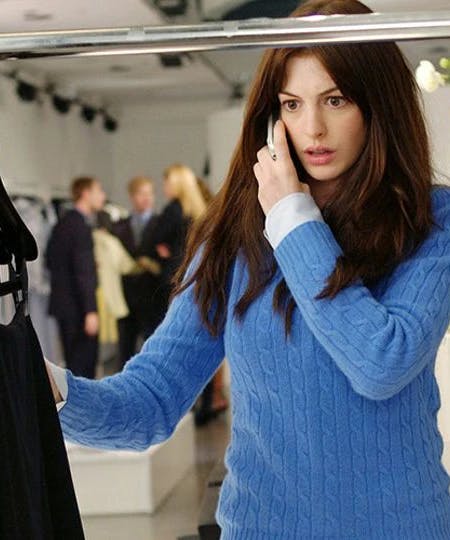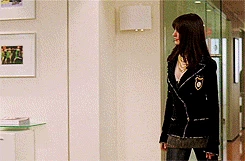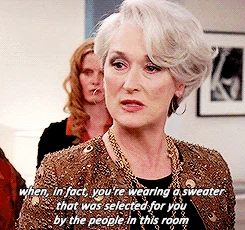Is Comfortable Clothing Actually Better? Why Dressing Down Might Hurt Your Self-Esteem
How you dress impacts how you look. How you look impacts how you feel. How you feel impacts how you perform.

Anne Hathway’s character Andy from the movie The Devil Wears Prada doesn’t know the first thing about style. So when she begins working as a personal assistant to Miranda Priestly (Meryl Streep) at the high fashion magazine Runway, she’s in over her head. She wears shapeless sweaters, frumpy skirts, and hideous slip-ons. She doesn’t even bother to brush her hair. If Runway is Gucci, then Andy is Walmart.

Not only is Andy clueless about high fashion, she believes that it’s beneath her. Andy has a miserable time at the job, and in a moment of despair, comes close to quitting. Just when she feels like she’s tried everything to succeed, she realizes there’s one thing she has yet to try: dressing the part. Andy embraces the high fashion lifestyle, Chanel boots and all. Suddenly she sits with her shoulders back, she answers the phone with confidence, and her walk becomes more of a strut. Andy’s new look gives her a newfound confidence and propels her forward in her career.

Of course, by the end of the movie, Andy finds herself and ditches the high fashion look. But in the final scene, she’s still found in jewelry, styled hair, and a classic brown leather jacket. Her ensemble might not scream “high fashion,” but it certainly screams “career success.”
Andy had all the qualities required to be successful, but it wasn’t enough. It wasn’t until she dressed for the job that she found confidence in the job, which led to success in the job. What can Andy’s dramatic transformation teach us about dressing for success?
Looking the Part
What we wear has an impact on the confidence that we have in our role. When Andy started dressing like she works at a high fashion magazine, she gained confidence, opportunities, and career success working at a high fashion magazine. Putting Hollywood aside for a moment, dressing the part for your real-life role could make all the difference.
Andy’s new look gives her a newfound confidence and propels her forward in her career.
In the book Mind What You Wear, Professor Karen Pine explores the relationship between clothing and confidence. In one study, she gathered a group of women to perform a math test either in a bikini, a sweater, or a white lab coat. The women wearing a bikini performed the worst, whereas the women wearing a lab coat had better mental agility. In another study, students wearing a Superman t-shirt rated themselves as more likable and physically stronger than students wearing a plain white t-shirt. This research suggests that the way you dress does in fact influence your ability to perform better at your job.
The Role Dressing Up or Down Plays on Self-Esteem
Despite all the hype, people still care about how they look. There’s a reason that the beauty, apparel, and cosmetic surgery industries are all worth billions. Women especially want to feel confident whenever they leave the house. But what’s the relationship between comfort and confidence? Car manufacturer Kia ran a survey on what makes people feel confident and compiled a list of the top 10 answers separated by gender. For men, 5 out of the top 10 responses were related to appearance. For women, 7 out of the top 10 responses were related to appearance.
The results for women were hardly casual. Lipstick, designer perfume, and walking in heels all made the top 10. None were particularly related to comfort, which suggests that comfort isn’t the most important factor of feeling confident.
Choosing to dress up breaks the negative cycle of self-deprecation in favor of a positive cycle of self-affirmation.
Not only does the way you dress impact your confidence, but it also impacts your mood. If you’re in a lousy mood, you have two options: feed the cycle or break the cycle. The easy way out is by staying in your sweats and affirming your negative emotions. However, you’ll likely feel much better by cleaning up, putting on a sharp outfit, and doing your hair and makeup. The latter is not as "comfortable," but as we’ve learned, comfort isn’t necessarily a recipe for confidence. Choosing to dress up breaks the negative cycle of self-deprecation in favor of a positive cycle of self-affirmation.
You're Sending a Signal Whether You Like It or Not
The way we dress sends signals to the world. Even if you dress in a way that attempts not to make a statement, it still sends the signal that you’re attempting not to make a statement. Andy finds this out the hard way after mocking the fashion industry. Miranda lectures Andy on her appearance: “You go to your closet, and you select that lumpy blue sweater because you’re trying to tell the world that you take yourself too seriously to care about what you put on your back.” Isn’t it incredible how much a blue sweater can say?

Miranda goes on to emphasize the role that fashion plays in our lives: “It’s somehow comical that you think that you’ve made a choice that exempts you from the fashion industry.” The good news is that if you accept that you’re not exempt from the fashion industry, you can control to a certain extent how others perceive you. If sending a signal is inescapable, you might as well consciously decide which signal you wish to send.
The Decline of Dressing Beautifully
Beyond the individual level, our physical appearances communicate our values as a culture. There’s no doubt that the North American style of dressing has significantly declined over the past century, particularly in the last 50 years. It’s not uncommon to see jeans at formal events, pajamas at the supermarket, and athletic wear outside the gym. It’s almost as if the only standard is having something on at all, and even that isn’t always met.
Reveling in beauty is exactly what could make our world a little bit brighter.
The decline of dress has brought a certain lack of culture to our everyday lives, and it represents a lack of respect for ourselves, for others, and for beauty. Perhaps our world is too dark to revel in beauty. Or perhaps, reveling in beauty is exactly what could make our world a little bit brighter.
Closing Thoughts: You Set the Standard for Your Life
In college, I made the conscious decision to dress better. I wore more dresses, styled my hair, and dressed appropriately for each occasion. Not a drastic change, but it was enough to make a difference. At first, I got many stares and questions. But it didn’t take long for others to expect this new way of dressing from me. It became my norm.
Many are afraid to dress up for their life, mostly out of fear of what others will think of them. I've been asked “What are you all dressed up for!?” many times, as if my life isn’t worth dressing up for. Each moment you decide what you will do with your time. Presumably, each thing you do is the most important thing you could be doing at that moment. Don’t you think that’s worth getting dressed up for?
Help make Evie even better! Take the official Evie reader survey.